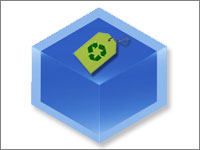A Case of Blue-Box Blues
 GLOBE-Net - The slowing global economy is hitting recyclers with a vengeance in British Columbia. The value of low-grade plastics, tin, steel, paper, glass and cardboard has dropped so sharply that transfer stations, recycling depots and private salvage yards can no longer find buyers for their reusable materials.
GLOBE-Net - The slowing global economy is hitting recyclers with a vengeance in British Columbia. The value of low-grade plastics, tin, steel, paper, glass and cardboard has dropped so sharply that transfer stations, recycling depots and private salvage yards can no longer find buyers for their reusable materials. “Prices have absolutely tanked,” says Ernie Fleischer, owner of Scott Road Trading in Surrey, B.C. during an interview with the Bowen Island Undercurrent. “In 40 odd years I have never seen anything like this.”
Residents of Bowen Island, off the coast of West Vancouver, have even been asked to keep their mixed plastics in their homes because recycling companies no longer have any room.
One reason for the bottleneck is the drop in China’s production of finished goods due to declines in key consumer markets, lowering the need for packaging materials. China, for instance, needs fewer corrugated boxes to pack Christmas toys because consumers in North America and Europe are pinching their pennies this year.
Another reason is the credit market crunch. Sellers require letters of credits from banks to guarantee that buyers will make their payment. But the market is no longer running smoothly. According to the Bowen Island Undercurrent, a Korean steel mill’s $15 million line of credit was chopped down to $3 million by lenders. The company was immediately unable to buy Canadian metal.
Steel Pacific, the largest metal recycler on Vancouver Island, used to pay $225 to $240 a ton for scrap metal. Today it is paying $20 for the same amount, says the Saanich News. The situation with paper is even worse.
Some recycling companies have resorted to letting go of their personnel. Scott Road Trading lay off five employees, a quarter of his staff. Steel Pacific trimmed its staff of 150 to 45 employees. The company also shortened its opening hours and stopped working on Saturdays.
“We were shipping out on average about two barge loads (of metal) a month,” says Reid Hudson, Marketing Manager at Steel Pacific. “And we are down to basically none,” he tells the Saanich News. Steel Pacific also is locked into contracts to handle recyclables until 2012 and must pay the regional district a guaranteed “floor” price for materials picked up at curbside.
Some of the recyclers are simply stockpiling the commodities on their property until a solution is found. Metro Waste Paper Recovery on Vancouver Island even sent excess tin cans to Steel Pacific’s depot.
“We’re stockpiling materials with anticipation that prices will come back,” says Anne Borrowman, spokeswoman for Alpine Disposal and Recycling in a Nanaimo News Bulletin interview. “The best we can do is deal with it without passing charges on to customers and wait for prices to go back up.”
Some commodities still have market value in British Columbia, especially aluminum beer and soda cans along with high-grade plastics. But that is one unusual ray of sunshine. “Avoid buying anything packaged in low grade plastics - numbers 3 through 7,” points out the Recycling Council of British Columbia. “Look for the number in the recycling symbol on the bottom of the container. These plastics have virtually no value right now.”
The world will recover from the global economic meltdown, but it is anyone’s guess as to when that will happen. Meanwhile, consumers should try to reduce the amount of waste in their everyday lives. This might mean turning to reusable bags instead of wrapping paper during the gift exchange at Christmas.
In fact, if every Canadian family reduced its weekly waste during the holidays by just one kilogram, the country could eliminate 34,000 tons of garbage - a gift Canada’s municipalities would surely appreciate during this holiday season.
You can return to the main Market News page, or press the Back button on your browser.

